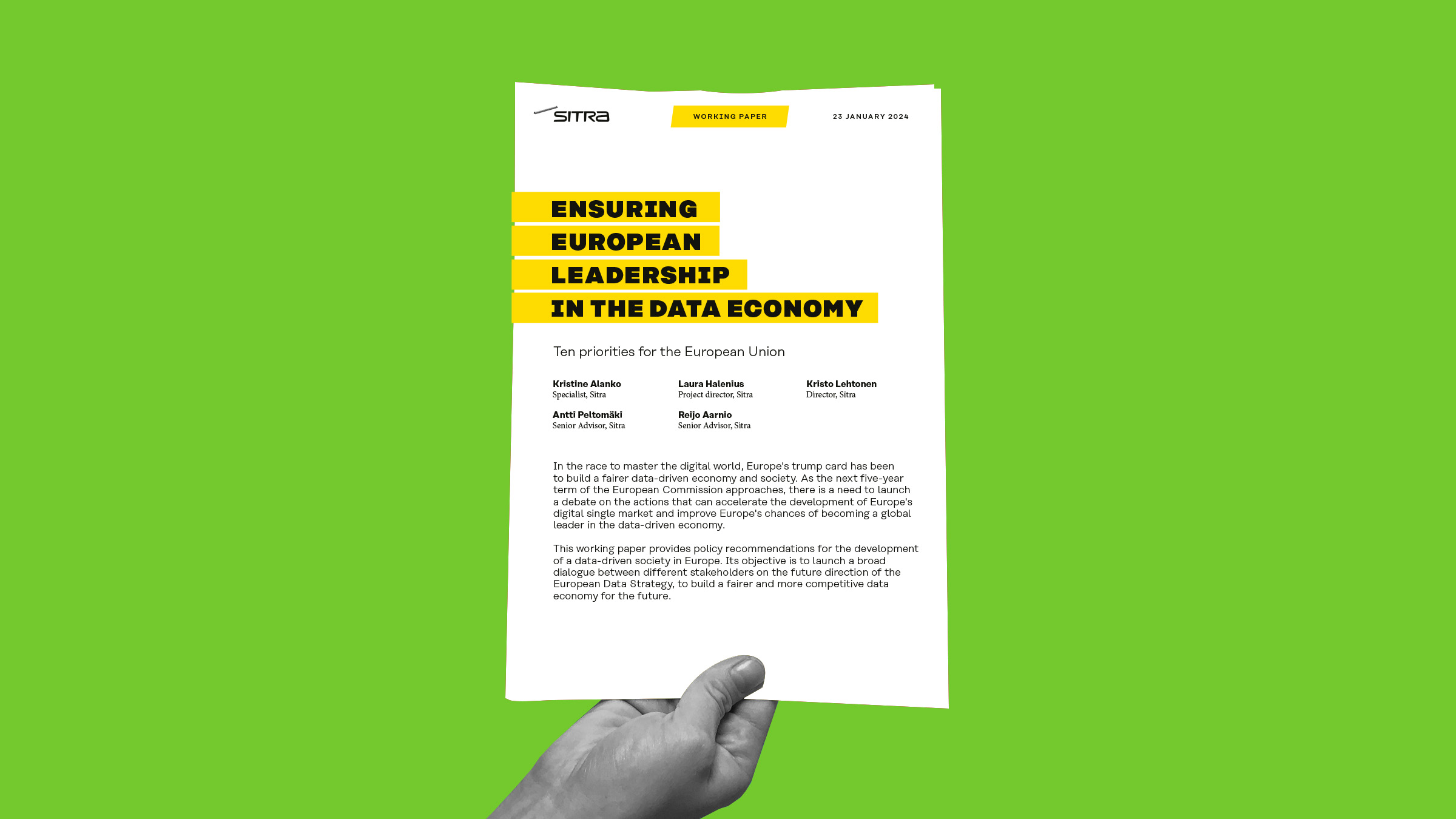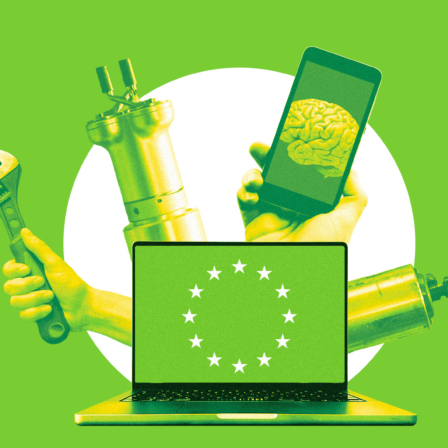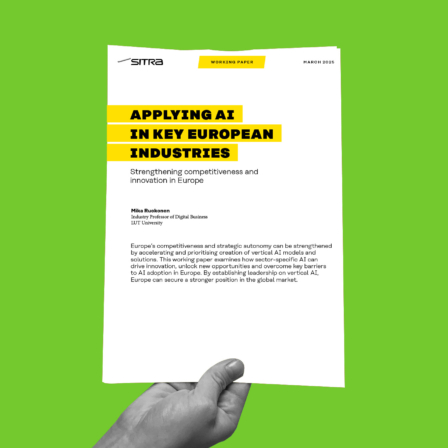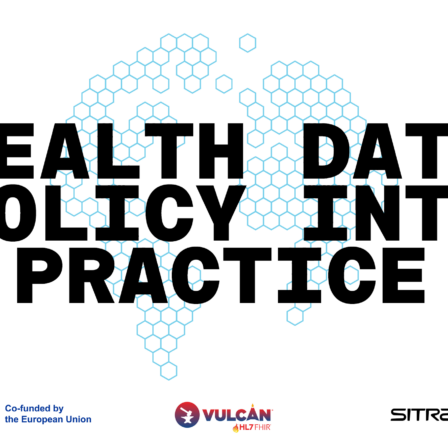Foreword
The next five-year term of the European Commission will be a watershed moment for Europe’s data economy. The European Union will need to strike the right balance between new and ambitious strategic initiatives on the one hand and the implementation of the existing data legislation by Ursula von der Leyen’s Commission on the other. The current Commission’s data legislation, such as the Digital Markets Act (DMA), the Digital Services Act (DSA), the Data Act (DA), the Data Governance Act (DGA) and the Artificial Intelligence Act (AIA), was and is historic, but the jury is still out on its ultimate impact, as much will depend on what the next Commission decides to do.
This paper highlights ten priorities and makes 28 policy recommendations on the next steps for the European data strategy to ensure leadership in the fair data economy. These recommendations support the vision of a genuine single market for data and continued efforts to build on what has already been achieved in recent years.
Going forward, the EU must continue its role as a regulatory superpower in the data economy, as it has done since the General Data Protection Regulation (GDPR) came into force in 2016. This role is often criticised on the basis that “referees don’t win games”, but this view misses the point. As the competition for digital power in our economies intensifies, the world needs fair rules. Even major democratic powers like the US often seem incapable of regulating digital markets, leaving the rule-making largely to powerful corporations. But the EU has shown in recent years, with increased confidence and self-assuredness, that it can pass groundbreaking new laws. By harnessing the power of its internal market and regulating it, the EU can currently claim to be a world leader.
But to move forward, the new legislation must be properly implemented and enforced in a manner that supports the competitiveness of European businesses. Furthermore, as major economic powers, such as the US and China, continue to pour huge amounts of capital into strengthening their domestic industries, Europe needs to be strategic in its approach. We should therefore resist a full-blown global subsidy race, but neither should we be naïve about the changing geoeconomic landscape.
We propose a strategic approach focusing on the most important critical technologies, such as quantum technologies and generative AI. In addition, the experience of companies – which have been keen to seize the new opportunities offered by the new data legislation – provides some clear lessons. Namely, we need to focus on making compliance much more effortless, even automated. We also need more active measures to reap the benefits of data. Increasing labour productivity and social well-being through the smart use of data, in particular in certain key areas of the data economy such as health and the green transition, is where we need to focus most, based on our experience.
This working paper by the Finnish Innovation Fund Sitra has two goals. Firstly, it offers building blocks for the digital policy areas that need attention. And secondly, it aims to stimulate an early debate among stakeholders on what the continuation of the European data strategy – the Data Strategy 2.0 – should look like. This paper is based on numerous publications (think tank research and development work), pilots and trials, stakeholder discussions, and expert workshops held in Finland, Belgium and Spain. We would like to thank everyone who gave their time, ideas and expertise to this work, and in particular, the European Policy Centre for hosting the discussions with us in Brussels.
23 January 2024
Kristo Lehtonen and Laura Halenius
Kristo Lehtonen is the Director of the Fair Data Economy theme at Sitra. Laura Halenius is the Project Director of the Data and Competitiveness project at Sitra.
Summary
Access to data and the ability to use it are key enablers for innovation and growth in our increasingly data-driven economy. For the European Union to continue to set the ground rules and new policy initiatives for a fair data economy, it needs a common vision and an early identification and response to the trends that challenge Europe. In the race to master the digital world, Europe’s trump card has been to build a fairer data-driven economy and society. New measures to promote the data economy must continue to be based on European values.
As the next five-year term of the European Commission approaches, there is a need to launch a debate on the actions that can accelerate the development of Europe’s digital single market and improve Europe’s chances of becoming a global leader in the data-driven economy.
This working paper has two objectives. First, to provide policy recommendations for the development of a data-driven society in Europe. Second, to launch a broad dialogue between different stakeholders on the future direction of the European Data Strategy. It is structured around three themes that are central to building a fairer and more competitive data economy for the future:
Theme 1: Strengthen strategic thinking in critical technologies. Critical technologies such as AI, semiconductors, 6G, quantum technologies and HPC need to be developed more strategically to realise their full potential in the development of the data-driven economy. This will enhance the EU’s economic security, meaning its operational security and competitiveness.
Theme 2: Promoting the digital single market through better implementation and enforcement of data regulation. Focusing on the implementation and enforcement of regulation will be a priority for the next five years of the Commission. A fair data economy needs a functioning regulatory framework that strengthens the rights of individuals in digital environments. Compliance should be made easy and even automated for businesses.
Theme 3: Strengthening labour productivity and human and environmental well-being through data. Data-driven business models must be harnessed to improve productivity and well-being in society and create better opportunities for people. SMEs should play a key role in this. In addition to clear rules of the game for data, the EU must focus on building the necessary capacity to better use data to increase labour productivity as well as human and environmental well-being.
Under each theme, we describe the desirable future and the challenges we face today to achieve a more competitive digital single market and to strengthen the well-being of people and the environment. Under each theme, 10 priorities have been identified and 28 policy recommendations are proposed for the European Union.
Ten priorities to transform Europe’s data economy
1. Leverage investment and boost competitiveness in critical technologies.
The EU needs to work with member states to strengthen critical technologies through policy and funding programmes. These initiatives and programmes should focus on quantum technologies and high-performance computing, artificial intelligence, advanced semiconductor technologies, 6G and cyber security.
2. Make the EU a leader in trustworthy generative AI.
The EU should raise its level of ambition and strengthen its strategic autonomy, meaning its ability to act independently in the development of generative AI. The EU should ensure the availability and access to open-source large language models (LLMs) in all official EU languages. Competitive and trustworthy European large language models are essential for the development of new, domain-specific applications and commercial services. AI developers in the EU should have access to good quality data and access to and skills in the use of high-performance computing to support the development of robust LLMs.
3. Ensure EU leadership in the development of the next generation internet (Web 4.0).
Web 4.0, the anticipated next stage of Internet development, seamlessly connects virtual worlds and objects to the real world. The EU should ensure that virtual worlds and virtual economies are developed on the basis of our shared European values, by promoting the fair use of data, openness, interoperability and transparent governance. The EU needs to ensure a strong focus on copyright-protected content, thereby strengthening the rights of users of virtual worlds. The EU must allow decentralised autonomous organisations (DAOs) to register within the EU. The scope of the regulatory sandbox should be extended.
4. Improve the governance model of the new data legislation, the coordination of the development of data spaces and their interoperability.
The European Data Innovation Board should require that a harmonised set of rules will be developed for data spaces. The EU must also support the development of rolebooks, which act as a registry of roles and bodies involved in data sharing. Data space development should be supported at national level and this support can be organised, for example, through national hubs or service centres. The EU needs to ensure that the potential of regulatory technologies is exploited in the implementation of data and digital communications regulations, in particular to facilitate compliance by SMEs. The EU needs to improve interoperability by creating technical standards for data.
5. Ensure people’s rights in Web 4.0 virtual worlds and other emerging digital domains.
The EU should ensure that consumers have the right to control and access their data in new virtual environments. The Commission should ensure that the new data legislation and the General Data Protection Regulation are compatible. The EU should facilitate the movement of data linked to a user’s reputation and ensure interoperability between platforms. People’s right to control their own data and decide how it is used should be added to the Declaration of Digital Rights and Principles, and it must be ensured that people can and do exercise their rights.
6. Strengthen EU-level leadership in the data economy.
The EU needs to ensure that the importance of the data economy for economic and social renewal is understood in all member states. The development of the internal market must be guided and monitored in a timely manner. This monitoring should be supported by common indicators and their development must be supported by cooperation throughout the EU. The development of the digital single market should be monitored by developing indicators for measuring the cross-border movement of data. It is also necessary to ensure that the indicators also monitor the development of data-based applications and services in addition to the pure movement of data.
7. Support people’s AI and digital literacy
The EU should ensure adequate support to strengthen people’s AI and digital literacy. It should address the threats posed by AI-generated disinformation and continue to work with social media platforms to counter these threats. It should also promote technological innovation that supports democratic values.
8. Encourage SMEs to adopt data-driven business models
The EU needs to increase awareness on the data-driven business opportunities. The EU should provide tools and services to support businesses promote data-driven business. The creation of innovation ecosystems around new business models needs to be supported.
9. Boost Digital Product Passports as a tool for the twin transition
The European Commission, together with key stakeholders, should prepare the delegated acts to complement the Ecodesign Regulation and present the digital product passports to be introduced for selected product groups. The EU should promote the development of regulatory sandboxes to enable the development and wider uptake of digital passports through testing. Interoperability within the passport system should also be ensured to allow data sharing between different digital product passport value chains and data spaces.
10. Implement effectively the European Health Data Space
The EU should focus on the effective implementation of the European Health Data Space Regulation and accelerate progress in the single market for digital healthcare solutions through Horizon Europe and standardisation in this area. The EU should harness the potential of the use of AI in healthcare to deliver better technology-enabled digital services to citizens in line with European values.
Introduction: Making the European data economy work for business, democracy, people and nature
As technology becomes increasingly integrated into our daily lives, data collection and usage are on the rise. This has sparked debates about the rules of the digital world and the direction of technological development. The European Union faces two possible scenarios in the next five years: either re-emerging as a technological powerhouse or becoming increasingly dependent on foreign data giants.
We see two possible future scenarios ahead for the European Union. In the next five-year term, we may see the re-emergence of the EU as an economic powerhouse in the next stage of technological development. Alternatively, we could see an ever-increasing European dependence on foreign data giants. Unless we continue on the path of strategic action, the EU will find itself on the latter course.
The COVID-19 pandemic and Russia’s invasion of Ukraine have taught us Europeans a lesson about critical dependencies. When supply shocks hit certain critical technologies, such as semiconductors, we saw how major economies prioritised the needs of their own industries at the expense of the rest of the world. As technology becomes increasingly central to the economy and society as a whole, we need strategic autonomy in critical technologies to strengthen security of our economy and to allow our companies to compete on a level playing field.
The digitalisation of text, images, music, and video has generated an endless supply of reproducible digital data. We are entering a new phase in this process with the digitalisation of 3D objects. For example, we have recently seen a rapid increase in use cases such as digital twins in optimisation, modelling and documentation.
At the same time, the use of artificial intelligence (AI) is accelerating in all industries and walks of life. AI is needed both to process the exponentially growing data volume and to recognise patterns in the complex datasets that elude the human eye. The race for strategic autonomy in AI will essentially be a battle for data and the rules for using that data – particularly in generative AI (GenAI).
Digital technologies are essential to support the green transition, productivity and prosperity. However, the digital and green transitions are not automatically linked (as digital technologies currently consume vast amounts of energy and remain a significant source of carbon emissions), and care must be taken when using digitalisation to promote the green transition (Ministry of Economic Affairs and Employment 2022).
Data, not oil, has become the most important and most valuable resource of our time. During the term of the next Commission, we will see technology challenging various strongholds of the European data economy, including industrial and health data. The key question will be about market power: who gets to set the rules?
The tension between authoritarian and democratic values is currently increasing political and geopolitical instability, demanding an ethical approach to technologies and to create space for European values. It is crucial that we ensure that gatekeeper companies (European Commission 2023c) do not hoard our data in their vaults, or set the rules based on their narrow interests, or abuse their dominant market power to prevent new innovation or new entrants from accessing the market, as has happened in the past.
It is important for Europe that we ensure data interoperability. New data regulations can offer the potential of a new “GSM moment” (global system for mobile communications) for businesses in Europe. The new EU data regulations require that data moves, without stating how. A similar leap was made in telecoms markets decades ago to allow phone calls between different operators. At the time, operators resisted, arguing that this kind of interoperability was impossible because each operator kept track of its subscribers in a different way. However, when this new standard became mandatory, operators had no choice but to adopt the GSM standard, which enabled EU-wide roaming. GSM became a European and then a global standard.
Today, we face a similar situation. The more European companies are involved in shaping future rules, the more likely they are to form the basis of EU and ultimately global rules and standards. New data legislation can re-energise innovation and growth in Europe.
The race for a fairer data economy is therefore not about protectionism. It is about fostering relationships with like-minded international partners, while preserving innovation and fair competition, where the rules are set by democratic institutions. It is about our values, business, democracy, people and natural environment.
We have divided the ten priorities and 28 policy recommendations in this document under three themes, components for the next phase in shaping the future of a fairer European data economy. In each part we introduce the key challenges facing the European data economy and provide policy recommendations to overcome these challenges.
Theme 1: Strengthening strategic thinking in critical technologies. Harnessing the potential of critical technologies, such as AI, semiconductors, 6G, quantum technologies and high-performance computing for the next stage of the data economy, will improve the economic security and EU’s competitiveness.
Theme 2: Promoting the digital single market through better implementation and enforcement of data regulation. A fair data economy requires a well-functioning regulatory framework that is promoting the rights of individuals in the digital sphere and making compliance for companies easy, even automated.
Theme 3: Strengthening labour productivity and human and environmental well-being through data. Data-driven business models need to be harnessed to increase productivity and well-being in our societies and to create better opportunities for citizens. Having clear rules on data is not enough. The EU should focus on delivering the necessary capabilities to enable the better utilisation of data to increase labour productivity and social well-being. SMEs should be at the centre of this.
Theme 1: Strengthening strategic thinking in critical technologies
Harnessing the potential of the most important key enabling and emerging technologies, such as AI, semiconductors, 6G, quantum technologies and high-performance computing for the next stage of the data economy, will improve the EU’s economic security and competitiveness.
Strategic autonomy in this paper refers to the EU’s ability to defend and promote its values and interests in a world currently characterised by geopolitical tensions and geoeconomic competition between the major global powers. It requires the EU to strengthen its own resilience and to reduce over-dependence on key enabling and emerging technologies that are considered critical for our economy, security or the democratic development of our societies. To address this, the European Commission, in October 2023, identified 10 critical technology areas for the EU’s economic security, and started a process with member states to identify vulnerabilities in value chains (European Commission 2023b).
Without a strategic approach to key technologies such as AI, semiconductors, 6G, quantum technologies and high-performance computing, the EU risks missing out on the next wave of innovation in the data economy that will be critical for the age of post-quantum cryptography; the development of cryptographic algorithms that are considered to be secure against attack by a quantum computer (NIST 2024). Falling behind in next-generation innovation will lead to the EU becoming too dependent on technologies controlled by other countries, such as China and the US.
Despite geopolitical tensions, the EU should remain open to building stronger relationships with like-minded international partners and promoting a global rules-based order, including in areas such as the ethical and trustworthy use of AI. The successful implementation of the Artificial Intelligence Act (AIA) is seen as a prerequisite for this (European Commission 2023f).
The EU should actively engage in steering the development of internet technologies as outlined in the Web 4.0 strategy (European Commission 2023d). The next generation of internet technologies operate from a different paradigm, and are based on a decentralised model, which represents a new opportunity for European companies. These decentralised solutions based on blockchain technology will challenge the power of current gatekeepers as defined by the European Commission (European Commission 2023c). A decentralised internet can potentially offer a more just and fair future, where the balance of power and wealth is more evenly distributed between different actors.
The following priorities and policy recommendations aim to leverage investment and boost competitiveness in strategic technologies. Together, these technologies can be seen as the technological foundation of the European data economy and the next generation of internet (Web 4.0).
Priority 1: Leverage investment and boost competitiveness in critical technologies
The US and China are investing enormous sums in order to take the lead in the global technology “arms race” (Bradford 2023). Europe is at risk of falling behind in this technology race and will therefore be unable to compete in the next wave of innovation in the data economy. As a result, the EU and its member states will develop excessive dependencies on non-European entities due to the lack of a strategic approach to critical technologies. A particular challenge for Europe is its ability to turn research, development and innovation (RDI) investments into commercially competitive products and services more effectively, as well as the lack of available venture capital for scaling up businesses.
Policy recommendation
- The EU should aim to strengthen critical technologies through ambitious and coordinated programmes together with the member states, mobilising public and private investment and encouraging venture financing. Key areas of focus should include quantum technologies and high-performance computing (HPC), AI, advanced semiconductor technologies, 6G, and cybersecurity, in preparation for the era of post-quantum cryptography.
Priority 2: Make EU a leader in trustworthy generative AI
European strategic autonomy is also currently challenged by external dependencies on gatekeeper companies in GenAI, which will only increase if no action is taken (European Commission 2021; Bradford 2023). The EU should be able to provide access to high-quality open-source foundation models (text-based, audio, imagery) and the ability to further train these foundation models and build purpose-specific services on top of them. In addition, enabling components, such as access to skills and knowledge in the use of high-performance computing, that enable the development of foundation models, such as robust large language models (LLMs), are equally crucial. For example, in text-based GenAI, gatekeeper companies concentrate mainly on major languages when training foundation models and these services are primarily accessible via application programming interfaces (APIs). This creates the risk of a societal AI divide, leaving smaller and less dominant languages and the companies operating in those languages, at a disadvantage. In addition, the EU has no control over how these gatekeepers might change their terms of services, pricing or method of training their large language models. The value derived from foundation models is generated at the software product level, but these base models must first meet European quality standards (European Commission 2023f; 2023g) before value can be created through downstream applications.
Policy recommendations
- The EU should raise its ambition and prioritise strategic autonomy in GenAI as an explicit policy goal for the Union. It is also crucial that the EU strengthens the availability of ‘in-house’ quality, such as products, services and training data that comply with relevant EU regulations, such as the Artificial intelligence Act. In addition, the access to and skills in the use of high-performance computing to support the development of robust LLMs is crucial.
- The EU should ensure the availability of and access to open-source foundation models. For text-based GenAI, open-source LLMs should be available in all official EU languages.
The EU should ensure the development of competitive (European Commission 2023g) and trustworthy LLMs, which are essential for building domain-specific applications on top of the foundation models. Adherence to the quality and compliance requirements of the AIA will ensure that the technology embedded in products is trustworthy.
Priority 3: Ensure EU leadership in the next generation of internet (Web 4.0)
The US currently holds a dominant position in both investment and the development of the next generation of the internet, as the US is the primary home of gatekeeper technology companies (European Commission, 2023c). Most virtual worlds are being created by a handful of gatekeeper companies outside the EU, and these companies have extensive technological and human capital resources, as well as significant financial strength. This presents a challenge for Europe: to take a leading role in the development of virtual worlds that respect and promote EU values. Moreover, the tokenisation of financial, virtual and real-world assets has the potential to revolutionise the transfer of value (Sitra, 2022c; Forbes, 2023), creating a global settlement layer that seamlessly integrates on-chain and off-chain environments. On-chain assets are digital items whose ownership and transactions are recorded on a blockchain, while off-chain assets include real-world assets such as real estate or commodities.
Policy recommendations
- The EU should ensure that virtual worlds and virtual economies put people first and uphold European values by promoting the fair use of data, openness, interoperability, and transparent governance. This approach would avoid the creation of isolated, non-interoperable systems.
- The EU should ensure that there is a strong focus on copyright-protected content in virtual worlds.
- The EU should allow for decentralised autonomous organisations (DAOs) to register as legal entities within the EU on a voluntary basis. The DAO framework is a vital innovation for the governance of virtual worlds.
The EU should broaden the scope of its current blockchain sandbox programme, European blockchain regulatory sandbox for Distributed Ledger Technologies (European Commission, 2023e), and expand it into a Web 4.0 sandbox, covering new emerging areas such as tokenisation, the intersection of AI and blockchain and virtual worlds. The sandbox should also permit real-world experimentation.
Theme 2: Promoting the digital single market through better implementation and enforcement of data regulation
A fair data economy requires a well-functioning regulatory framework that is promoting the rights of individuals in the digital sphere and making compliance for companies easy, even automated.
The EU has been working towards a fair data economy by enacting a comprehensive regulatory framework for data. The next challenge is an effective implementation of the legislation in a way that helps, rather than hinders, business competitiveness. Success will depend on the ease of compliance for individuals and companies.
Based on empirical findings from Sitra’s studies (Sitra 2022a), the level of complexity associated with the new data legislation is currently seen as too much of a challenge for businesses to navigate. Citizens and companies should not have to be required to understand all the details. Compliance with data sharing rules should be easy and ideally automated.
To build a fairer digital economy, regulation should specifically aim to extend, strengthen and create new rights for individuals. We currently lack control over the data that is collected about us. This was made clear by Sitra’s Digipower investigation, which tracked the personal data flows of decision-makers and exposed the huge volumes of data collection, coupled with the unfair, even unlawful practices by data giants (Sitra 2022b).
The concept of data portability was introduced in the GDPR legislation for personal data. This right to data portability (Sitra 2023i), is de facto extended through the implementation of the Data Act (for IoT devices) and sectoral regulations, such as the European Health Data Space (for the secondary use of health data) (Sitra 2020).
In the future, Europe can tap into the potential of making more data available, by putting individuals at the centre of decisions not only about personal data flows, but also about the data they generate. People’s control over their own data goes hand in hand with the exercise of economic rights, such as the right to choose (Sitra 2023i).
Data economy regulation in the EU is now undergoing a major transformation. The EU data strategy and the Digital Decade programme both set a framework and provide an overview of the EU’s data economy goals. Building a common situational awareness of the progress of strategic priorities and regulatory processes is key to ensuring that we can proactively define the ground rules and initiatives for the data economy of the future.
Priority 4: Improve the governance model of the new data legislation, the coordination of the development of data spaces and their interoperability
The level of complexity incorporated into the new data legislation is very hard for businesses to navigate. It becomes even more complicated with the three levels involved – EU bodies, member states and data spaces (Sitra 2023g). Companies’ compliance with data-sharing rules should be easy, preferably automated, and not a time and resource consuming research task.
At present, the support for data spaces is organised at the EU level through the Data Spaces Support Centre (DSSC), an EU-funded project in which Sitra is a partner. However, most data space initiatives start within a single member state and need localised support.
Policy recommendations
- In the guidelines for Common European data spaces, the European Data Innovation Board (EDIB) should request data spaces to create a rulebook and include a common principles-based rulebook template that explicitly defines the general principles (ethics, human-centricity, fairness) that are shared by all Common European data spaces.
- The European Commission should support the creation of an open, transparent, and dynamic register of all roles and decision-making bodies involved in data sharing, called a rolebook. This framework should be implemented at the EU and the member state level. The rolebook would take the form of a registry hosted by the Data Spaces Support Centre (DSSC).
- The European Commission should ensure that national-level support for the data spaces is organised through local hubs and networked at the European level. In addition, the Commission should develop new funding models to support the growth-oriented orchestration of data spaces. Funding models should encourage the joining of data spaces as early as possible.
- The Commission should ensure that innovative regulatory technology (RegTech) solutions are included in the implementation of the current data and digital regulation. This will lead to a simplification of regulatory complexity and improve SMEs’ access to digital regulatory tools. This also requires supporting the development of a European RegTech ecosystem.
- The European Union should address the low interoperability by prioritising the creation of technical standards for data. Interoperable infrastructures are also key to speed up the process of the configuration of the European data spaces.
Priority 5: Ensure people’s rights in Web 4.0 virtual worlds and other emerging digital domains
European citizens have little control over the huge volumes of data collected about them by digital giants, or gatekeeper companies, as defined by the European Commission in the Digital Markets Act. Citizens’ control over their own data goes hand in hand with the exercise of economic rights, such as the right to choose.
Policy recommendations
- The EU should ensure that consumers’ control over their own data, including the right to data portability, is safeguarded in the new virtual environments. Over time, the right to data portability should be extended to all digital data and environments.
- The European Commission should ensure the interoperability of the new data legislation with GDPR. Many companies participating in data spaces are reluctant to use personal data, due to concerns about privacy regulations. While GDPR includes obligations for the EU Commission to periodically report on the evaluation and review of data protection regulations, the EU should extend the scope of this assessment to the new legal framework. Consistency and interoperability between the different laws in force within the EU is crucial for competitiveness.
- The EU should establish a standardised reputation framework to ensure consistency and interoperability between platforms. Reputation portability refers to the ability of a user’s reputation, such as ratings, reviews, or ‘trustworthiness’, to be transferred or recognised across different online platforms and services. The EU should therefore develop a secure protocol for the transfer of reputation data that prioritises user privacy and data security, while at the same time mandating that citizens have control over their own data.
- Citizens´ right to self-determination and control over their own data, as well as their economic rights and symmetrical position vis-à-vis data controllers, that determine the purposes and means of processing personal data (European Commission 2016), should be included as part of the European Declaration on Digital Rights and Principles (European Commission 2022a). These rights and principles provide guidance for the EU and individual member states as they adapt to the digital transformation. For citizens these rights, and abilities to make use of them, build trust.
Priority 6: Strengthen EU-level leadership in the data economy
The Digital Decade policy programme (European Commission 2023i) with concrete goals and targets for 2030, will guide Europe’s digital transformation. The role of the data economy in achieving these goals is not sufficiently visible in the current digital compass. Considerable progress is still needed to achieve the EU’s goal of creating an internal market for data.
Policy recommendations
- The EU should ensure that there is a reliable knowledge base on cross-border data exchange and mobility within single market. One example of a possible indicator for measuring the European data economy would be the extent and seamlessness of the flows of health data between member states, as the free movement of EU citizens is already a reality.
- The EU should ensure that EU-wide cooperation is facilitated to develop data economy indicators. This work could also be linked to the development of indicators for the Digital Decade programme (European Commission 2023i). These new key performance indicators (KPIs) should focus not only on data flows, but also on the value added by data-driven applications and services. Adopting a more holistic approach (already being piloted in Finland, read more on the Data Economy Monitoring Tool below / on the page xx), is crucial to moving beyond the more ‘ground-level’ technological indicators of data flows.
Theme 3: Strengthening labour productivity and human and environmental well-being through data
Data-driven business models should be harnessed to increase the productivity and well-being of our societies and create better opportunities for citizens. Having clear rules on data is not enough. The EU should focus on delivering the necessary capabilities to enable the better use of data to increase labour productivity and social well-being. SMEs should be at the centre of this.
Better use and application of data will be key to improving the competitiveness of European businesses and achieving the EU’s sustainability goals (twin transition), as well as providing human-centric and trusted public and private services to all citizens.
As the transformation affects people’s lives and daily activities in many ways, their skills and agency in the data economy must also be strengthened. Emerging technologies such as GenAI represent not only an opportunity but also a potential threat to European democracy. For example, AI-generated disinformation has already been used to disrupt European elections. The challenge of GenAI disinformation is expected to increase in the future as the technologies mature.
It is therefore argued here that because the root causes of data isolation are quite different in different sectors, there should be a differentiated policy approach to address these challenges.
First, the EU should ensure that it promotes the twin transition in such a way that data is fully exploited in the pursuit of sustainable solutions, such as low-carbon energy sources, products and services and a resource-efficient circular economy. In addition, halting the loss of biodiversity and restoring ecosystems will require an effective and interoperable use of immense amounts of data collected for assessment, monitoring and compliance purposes.
Second, there is significant untapped potential to use data to provide new public and private services throughout Europe. The development of the European Health Data Space has been a long and difficult process, partly because of the private and sensitive nature of the health data itself. However, it is also a promising example that there are ways and means to overcome these difficulties for the benefit of citizens’ health and well-being.
Priority 7: Support people’s AI and digital literacy
European citizens are at the heart of the data economy: sometimes as targets of influence, often as users of the technology, but not as people with agency; the actors who shape the digital services that affect their daily lives. At present, citizens’ views and ideas are not being actively sought or widely taken into account when formulating Europe’s approach to new technologies.
Policy recommendations
- The EU should ensure that it allocates time and resources to actors (such as national agencies for education, civic organisations, and fact-checking agencies) that support digital literacy, such as data and AI literacy.
- The EU needs to effectively tackle AI-generated disinformation by continuing to work together with social media platforms and other relevant service providers. More importantly, the EU should encourage the digital industry to create new technological innovations that support democratic values, such as Civic Tech (Heinonen, Vahti 2023). The EU should ensure that citizens have the right to participate in public deliberation, have access to relevant and accurate information, possess the capacity to critically assess the effects of new technologies and have the right to form their own opinions without coercion or manipulation.
Priority 8: Encourage SMEs to adopt data-driven business models
Encouraging SMEs to adopt data-driven business models is expected to enhance productivity and innovation. This involves support mechanisms, funding opportunities and regulatory frameworks tailored to the needs of SMEs.
Policy recommendations
- The EU should strive to raise awareness of the opportunities offered by data-driven business. Awareness raising will help European SMEs to better understand and use data-driven practices and will increase their capacity to be data-driven.
- The EU should offer data-driven business improvement tools as a service to companies. SMEs in particular need easy and cost-effective ways to renew their business models and the skills needed to create new sustainable data-driven business. In addition, seed funding should be introduced to create innovation ecosystems for new business models, including bold pilots and systematic support for SMEs, to unlock new value from data.
Priority 9: Boost Digital Product Passports as a tool for the twin transition
There is a significant and largely untapped opportunity for digital technologies to advance sustainability goals and transform business models, so that data-driven sustainability becomes a competitive advantage for European businesses. The implementation of a Digital Product Passport (DPP) can significantly support the twin transition by providing transparent and accessible information, thus encouraging and incentivising businesses to adopt more sustainable practices and promoting a circular economy mindset. Several companies and industrial value chains have already shown their willingness to move forward with Digital Product Passports, both in the pilot stage and in scaling up solutions. Currently, the biggest bottlenecks relate to the maturity of both hard and soft infrastructure, in particular the lack of interoperability between frameworks and standards.
Policy recommendations
- The EU should work closely with the key stakeholders to prepare and rapidly adopt the first set of delegated acts under the proposed Ecodesign for Sustainable Products Regulation (European Commission 2022b), to introduce DPPs in priority products categories (European Commission 2023h).
- The EU should also use regulatory sandboxes for DPP testing and refining systems, and data solutions in a controlled environment, allowing companies to experiment with innovative approaches.
- The EU should ensure that an interoperability framework for the DPP system with standardised data formats is urgently implemented to ensure that data sharing within and across different DPP value chains and data spaces is possible from the outset.
Priority 10: Implement effectively the European Health Data Space
Member states and European companies building solutions for the health sector need guidance and coordination for the Europe-wide implementation of the European Health Data Space (EHDS). Success in building the health data space would also encourage other sectors. At present, no two member states are alike when it comes to digital healthcare solutions, and solutions are not sold across borders throughout the EU, and even less globally. The current situation is therefore considered as sub-optimal compared to the medical device markets where solutions are sold globally and where European companies have been very successful (Sitra 2023j).
Policy recommendations
- The EU should focus on a harmonised implementation of the EHDS regulation and accelerate the single market for digital healthcare solutions with the Horizon Europe capacity and standardisation. In particular, investment in common data models such as the Open Electronic Health Record (OpenEHR) for the persistence of health data and the Observational Medical Outcomes Partnership (OMOP) for research purposes, would pave the way for common solutions that work seamlessly throughout the EU single market.
- The EU should harness the potential of AI training and use in the health sector. Citizens should be provided with technology-enabled public services that meet the requirements of the Artificial Intellgence Act without compromising European values.
Annex: Summary of themes, priorities and policy recommendations
Theme 1: Strengthen strategic thinking in critical technologies
Priority 1: Leverage investment and boost competitiveness in critical technologies
- The EU should aim to strengthen critical technologies through ambitious and coordinated programmes together with the member states, mobilising public and private investment and encouraging venture financing. Key areas of focus should include quantum technologies and high-performance computing (HPC), AI, advanced semiconductor technologies, 6G, and cybersecurity, in preparation for the era of post-quantum cryptography.
Priority 2: Make the EU a leader in trustworthy generative AI
- The EU should raise its ambition and prioritise strategic autonomy in GenAI as an explicit policy goal for the Union. It is also crucial that the EU strengthens the availability of ‘in-house’ quality, such as products, services and training data that comply with relevant EU regulations, such as the Artificial intelligence Act. In addition, the access to and skills in the use of high-performance computing to support the development of robust LLMs is crucial.
- The EU should ensure the availability of and access to open-source foundation models. For text-based GenAI, open-source LLMs should be available in all official EU languages.
- The EU should ensure the development of competitive and trustworthy LLMs, which are essential for building domain-specific applications on top of the foundation models. Adherence to the quality and compliance requirements of the AIA will ensure that the technology embedded in products is trustworthy.
Priority 3: Ensure EU leadership in the next generation of internet (Web 4.0)
- The EU should ensure that virtual worlds and virtual economies put people first and uphold European values by promoting the fair use of data, openness, interoperability, and transparent governance. This approach would avoid the creation of isolated, non-interoperable systems.
- The EU should ensure that there is a strong focus on copyright-protected content in virtual worlds.
- The EU should allow for decentralised autonomous organisations (DAOs) to register as legal entities within the EU on a voluntary basis. The DAO framework is a vital innovation for the governance of virtual worlds.
- The EU should broaden the scope of its current blockchain sandbox programme, European blockchain regulatory sandbox for Distributed Ledger Technologies), and expand it into a Web 4.0 sandbox, covering new emerging areas such as tokenisation, the intersection of AI and blockchain and virtual worlds. The sandbox should also permit real-world experimentation.
Theme 2: Promoting the digital single market through better implementation and enforcement of data regulation
Priority 4: Improve the governance model of the new data legislation, the coordination of the development of data spaces and their interoperability
- In the guidelines for Common European data spaces, the European Data Innovation Board (EDIB) should request data spaces to create a rulebook and include a common principles-based rulebook template that explicitly defines the general principles (ethics, human-centricity, fairness) that are shared by all Common European data spaces.
- The European Commission should support the creation of an open, transparent, and dynamic register of all roles and decision-making bodies involved in data sharing, called a rolebook. This framework should be implemented at the EU and the member state level. The rolebook would take the form of a registry hosted by the Data Spaces Support Centre (DSSC).
- The European Commission should ensure that national-level support for the data spaces is organised through local hubs and networked at the European level. In addition, the Commission should develop new funding models to support the growth-oriented orchestration of data spaces. Funding models should encourage the joining of data spaces as early as possible.
- The Commission should ensure that innovative regulatory technology (RegTech) solutions are included in the implementation of the current data and digital regulation. This will lead to a simplification of regulatory complexity and improve SMEs’ access to digital regulatory tools. This also requires supporting the development of a European RegTech ecosystem ecosystem.
- The European Union should address the low interoperability by prioritising the creation of technical standards for data. Interoperable infrastructures are also key to speed up the process of the configuration of the European data spaces.
Priority 5: Ensure people’s rights in Web 4.0 virtual worlds and other emerging digital domains
- The EU should ensure that consumers’ control over their own data, including the right to data portability, is safeguarded in the new virtual environments. Over time, the right to data portability should be extended to all digital data and environments.
- The European Commission should ensure the interoperability of the new data legislation with GDPR. Many companies participating in data spaces are reluctant to use personal data, due to concerns about privacy regulations. While GDPR includes obligations for the EU Commission to periodically report on the evaluation and review of data protection regulations, the EU should extend the scope of this assessment to the new legal framework. Consistency and interoperability between the different laws in force within the EU is crucial for competitiveness.
- The EU should establish a standardised reputation framework to ensure consistency and interoperability between platforms. Reputation portability refers to the ability of a user’s reputation, such as ratings, reviews, or ‘trustworthiness’, to be transferred or recognised across different online platforms and services. The EU should therefore develop a secure protocol for the transfer of reputation data that prioritises user privacy and data security, while at the same time mandating that citizens have control over their own data.
- Citizens´ right to self-determination and control over their own data, as well as their economic rights and symmetrical position vis-à-vis data controllers, that determine the purposes and means of processing personal data should be included as part of the European Declaration on Digital Rights and Principles. These rights and principles provide guidance for the EU and individual member states as they adapt to the digital transformation.
Priority 6: Strengthen EU-level leadership in the data economy
- The EU should ensure that there is a reliable knowledge base on cross-border data exchange and mobility within single market. One example of a possible indicator for measuring the European data economy would be the extent and seamlessness of the flows of health data between member states, as the free movement of EU citizens is already a reality.
- The EU should ensure that EU-wide cooperation is facilitated to develop data economy indicators. This work could also be linked to the development of indicators for the Digital Decade programme (European Commission 2023i). These new key performance indicators (KPIs) should focus not only on data flows, but also on the value added by data-driven applications and services. Adopting a more holistic approach (already being piloted in Finland), is crucial to moving beyond the more ‘ground-level’ technological indicators of data flows.
Theme 3: Strengthening labour productivity and human and environmental well-being through data
Priority 7: Support people’s AI and digital literacy
- The EU should ensure that it allocates time and resources to actors (such as national agencies for education, civic organisations, and fact-checking agencies) that support digital literacy, such as data and AI literacy.
- The EU needs to effectively tackle AI-generated disinformation by continuing to work together with social media platforms and other relevant service providers. More importantly, the EU should encourage the digital industry to create new technological innovations that support democratic values, such as Civic Tech. The EU should ensure that citizens have the right to participate in public deliberation, have access to relevant and accurate information, possess the capacity to critically assess the effects of new technologies and have the right to form their own opinions without coercion or manipulation.
- The EU should strive to raise awareness of the opportunities offered by data-driven business. Awareness raising will help European SMEs to better understand and use data-driven practices and will increase their capacity to be data-driven.
- The EU should offer data-driven business improvement tools as a service to companies. SMEs in particular need easy and cost-effective ways to renew their business models and the skills needed to create new sustainable data-driven business. In addition, seed funding should be introduced to create innovation ecosystems for new business models, including bold pilots and systematic support for SMEs, to unlock new value from data.
Priority 9: Boost Digital Product Passports as a tool for the twin transition
- The EU should work closely with the key stakeholders to prepare and rapidly adopt the first set of delegated acts under the proposed Ecodesign for Sustainable Products Regulation, to introduce DPPs in priority products categories.
- The EU should also use regulatory sandboxes for DPP testing and refining systems, and data solutions in a controlled environment, allowing companies to experiment with innovative approaches.
- The EU should ensure that an interoperability framework for the DPP system with standardised data formats is urgently implemented to ensure that data sharing within and across different DPP value chains and data spaces is possible from the outset.
Priority 10: Implement effectively the European Health Data Space
- The EU should focus on a harmonised implementation of the EHDS regulation and accelerate the single market for digital healthcare solutions with the Horizon Europe capacity and standardisation. In particular, investment in common data models such as the Open Electronic Health Record (OpenEHR) for the persistence of health data and the Observational Medical Outcomes Partnership (OMOP) for research purposes, would pave the way for common solutions that work seamlessly throughout the EU single market.
- The EU should harness the potential of AI training and use in the health sector. Citizens should be provided with technology-enabled public services that meet the requirements of the Artificial Intellgence Act without compromising European values.
References
Bradford 2012. The Brussels Effect: How the European Union rules the World. New York: Oxford University Press.
Bradford 2023. Digital Empires: The Global Battle to Regulate Technology. New York: Oxford University Press.
European Commission 2016. Regulation (EU) 2016/679 of the European Parliament and of the Council of 27 April 2016 on the protection of natural persons with regard to the processing of personal data and on the free movement of such data, and repealing Directive 95/46/EC (General Data Protection Regulation), OJ L 119/1, 4 May 2016.
European Commission 2021a. Proposal For A REGULATION OF THE EUROPEAN PARLIAMENT AND OF THE COUNCIL Laying Down Harmonised Rules On Artificial Intelligence (Artificial Intelligence Act) And Amending Certain Union Legislative Acts. COM/2021/206 Final.
European Commission 2021b. Study supporting the impact assessment of the AI Regulation. Retrieved 20 December 2023f.
European Commission 2022a. Declaration on European Digital Rights and Principles. Retrieved 20 December 2023.
European Commission 2022b. Proposal for a REGULATION OF THE EUROPEAN PARLIAMENT AND OF THE COUNCIL establishing a framework for setting ecodesign requirements for sustainable products and repealing Directive 2009/125/EC. COM/2022/142 final.
European Commission 2023a. Commission Recommendation of 03 October 2023 on critical technology areas for the EU’s economic security for further risk assessment with Member States.
European Commission 2023b. Joint Communication to the European Parliament, The European Council and the Council on “European Economic Security Strategy”. JOIN(2023) 20 final. Retrieved 21 December 2023.
European Commission 2023c. Digital Markets Act: Commission designates six gatekeepers. Retrieved 5 January 2024.
European Commission 2023d. EU strategy to lead on Web 4.0 and virtual worlds (europa.eu)
European Commission 2023e. Sandbox Project – EBSI – (europa.eu)
European Commission 2023f. Press release: European Commission welcomes the political agreement on Artificial Intelligence Act. Retrieved 8 January 2024.
European Commission 2023g. AI Pact. Retrieved 20 December 2023.
European Commission 2023h. Commission welcomes provisional agreement for more sustainable repairable and circular products. Press Release. Retrieved 8 January 2024.
European Commission 2023i. Europe’s Digital Decade: digital targets for 2030. Retrieved 8 January 2024.
Finnish Government 2022. Government report: Finland’s Digital Compass. Publications of the Finnish Government 2022:71. Retrieved 22 December 2023. (PDF)
Forbes 2023. Larry Fink Says Tokens Are “The Next Generation For Markets” (forbes.com). Retrieved 21 December 2023.
Heinonen & Vahti 2023. ”Civic Tech could be key in protecting democracy”. Sitra Phenomenon. Retrieved 8 January 2024. [AK1]
Ministry of Economic Affairs and Employment of Finland 2021. Artificial Intelligence 4.0 First Interim Report: from launch to implementation stage. Retrieved 5 January 2024. (PDF)
Ministry of Economic Affairs and Employment of Finland 2022. Artificial Intelligence 4.0 programme: Finland as a leader in twin transition – Final report of the Artificial Intelligence 4.0 programme. (PDF)
Ministry of Economic Affairs and Employment, Ministry of Finance, Ministry of Transport and Communications 2022. Government report on the digital compass sets the course for Finland’s digital transformation. Press release. Retrieved 22 December 2023.
National Institute of Standards and Technology 2024. NIST to Standardize Encryption Algorithms That Can Resist Attack by Quantum Computers. Retrieved 5 January 2024.
Sitra 2020. Towards Trustworthy Health Data Ecosystems – How the reuse of data can create new services for the benefit of all. Sitra. Retrieved 21 December 2023.
Sitra 2022a. EU regulation builds a fairer data economy – The opportunities of the Big Five proposals for businesses, individuals and the public sector. Sitra. Retrieved 20 December 2023.
Sitra 2022b. Tracking Digipower – How data can be used for influencing decision-makers and steering the world. Sitra. Retrieved 20 December 2023.
Sitra 2022c. Web 3.0 and progress towards a new internet – What is it about and what does it offer us? Sitra Retrieved 5 January 2024.
Sitra 2022d. Gatekeeping in the digital age. Sitra. Retrieved 20 December 2023.
Sitra 2023a. Megatrends 2023. Sitra. Retrieved 20 December 2023.
Sitra 2023b. The impact of the circular economy on jobs and skills. Sitra. Retrieved 5 January 2024.
Sitra 2023c. Enabling the responsible use of technology at scale – Why Europe needs a regulatory technology innovation ecosystem. Sitra. Retrieved on 20 December 2023.
Sitra 2023d. Powering the social health and social care system with data – Better care and cost savings by using social and health data. Sitra. Retrieved 20 December 2023.
Sitra 2023e. The Finnish health sector growth and competitiveness vision 2030. Sitra. Retrieved on 20 December 2023.
Sitra 2023f. 6+1 Recommendations for Finland – How can regulation boost the prerequisites for Web 3.0 business? Sitra. Retrieved on 20 December 2023.
Sitra 2023g. Towards a holistic EU Data Governance – Taking stock of the progress of the EU Data Strategy and proposals. Sitra. Retrieved 20 December 2023.
Sitra 2023h. Putting Nature at the heart of the European Green Deal – Building blocks for the next European Commission. Sitra. Retrieved 20 December 2023.
Sitra 2023i. The right to data portability – Extending the right of individuals to benefit from managing their own data. Sitra. Retrieved 20 December 2023.
Sitra 2023j. Advancing data sharing to improve health for all in Europe – Main findings of joint action Towards the European Health Data Space 2021 – 2023. Sitra. Retrieved January 8 2024.
Sitra 2024a. Monitoring developments in the data economy – Data Economy monitoring tool. Retrieved 8 January 2024.
Sitra 2024b. Roadmap for a Fair Data Economy. Retrieved 8 January 2024.
Technology Magazine. Top 10: Metaverse companies | Technology Magazine. Technology Magazine. Retrieved 20 December 2023.






















Recommended
Have some more.